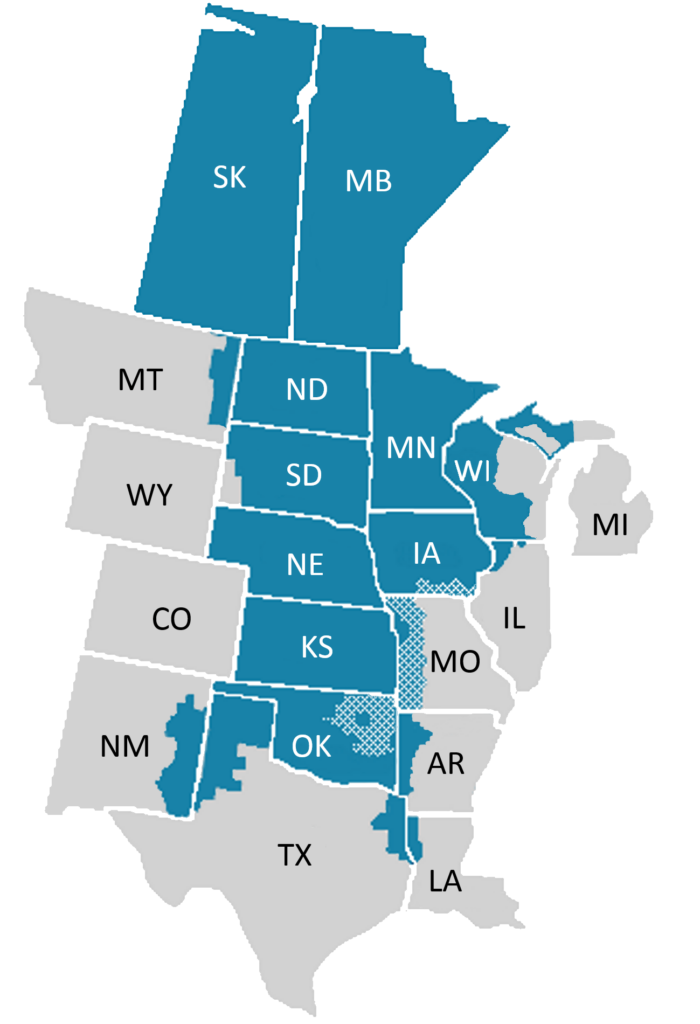
About MRO
MRO is committed to its mission to identify, prioritize and assure effective and efficient mitigation of risks to the reliability and security of the North American bulk power system in its regional footprint.

As part of the ERO Enterprise, MRO operates as a cross-border Regional Entity headquartered in Saint Paul, Minnesota. The MRO region spans the provinces of Saskatchewan and Manitoba, and all or parts of the states of Arkansas, Illinois, Iowa, Kansas, Louisiana, Michigan, Minnesota, Missouri, Montana, Nebraska, New Mexico, North Dakota, Oklahoma, South Dakota, Texas, and Wisconsin. The region includes approximately 225 organizations that are involved in the production and delivery of electric power, including municipal utilities, cooperatives, investor-owned utilities, transmission system operators, federal power marketing agencies, Canadian Crown Corporations, and independent power producers.
MRO’s primary responsibilities are to: ensure compliance with mandatory reliability standards by entities who use, own or operate the North American bulk power system; conduct assessments of the grid’s ability to meet electric power demand in the region; and analyze regional system events. Additionally, MRO creates an open forum for stakeholder experts in the region to discuss important topics related to addressing risk and improving reliable operations of the grid. MRO serves as a vital link between grid owners, users, operators, and other stakeholders who share common reliability interests in the region. MRO’s corporate documents and public reports can be found in the library.
History
In 2003, a wide, cascading blackout sent large portions of the Northeast United States and Canada (as far west as Ohio, Ontario and Michigan), into the dark – affecting an estimated 50 million people. As a result, to ensure reliability of the bulk power system in the United States, Congress passed the Energy Policy Act of 2005. The act created an Electric Reliability Organization (ERO) charged with developing and enforcing mandatory reliability standards, assessing current and future reliability trends, analyzing system events, and recommending improved practices. In 2006, the Federal Energy Regulatory Commission (FERC) approved the North American Electric Reliability Corporation (NERC) as the ERO under section 215(e)(4) of the Federal Power Act (FPA). In 2007, FERC approved delegation agreements between NERC and Regional Entities that carry out certain ERO functions within specific geographic areas. MRO is one of six Regional Entities operating under delegated authority by NERC today.
The ERO Enterprise (collectively NERC and the Regional Entities) recognizes the interconnectedness of the grid and has jointly developed arrangements with the governments of both Canada and Mexico. MRO is one of three cross-border Regional Entities who operate across the interconnected Canadian Provinces. MRO operates in Manitoba under the legislative framework in place in the province, and in Saskatchewan under a Memorandum of Understanding with Saskatchewan Power Corporation.
HERO
MRO achieves its mission ‘to identify, prioritize and assure effective and efficient mitigation of risks to the reliability and security of the North American bulk power system’ by promoting and supporting Highly Effective Reliability Organizations® (or HEROs). Our HERO program uses the theory and principles of high reliability organizations (HROs) as a framework for ensuring reliable and secure operations of the bulk power system within MRO’s regional footprint. HRO’s are organizations that have succeeded in avoiding catastrophes in environments where accidents can be expected due to complexity, interdependence, and risk.